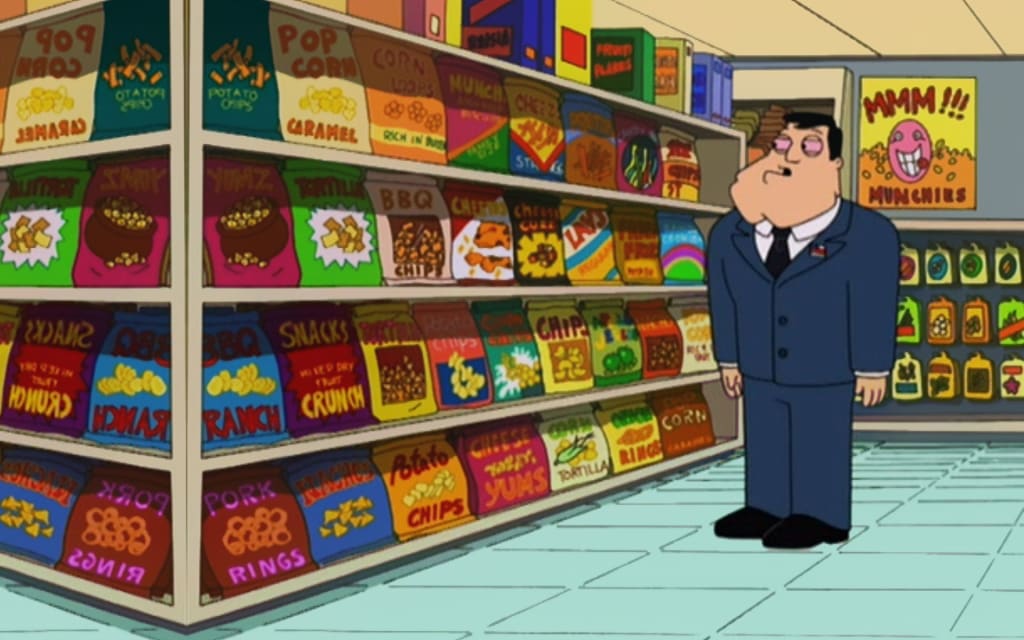How to Beat the Marijuana Munchies
Learning how to beat the marijuana munchies is the first step in becoming a healthier stoner.

All of us who have ever smoked weed know about “the munchies," defined as that desperate craving for sugar and carbohydrates which can send otherwise sane individuals rushing out in the middle of a snowstorm to purchase candy bars and pizza. Obviously, one does not need to be a doctor to suspect that years of overloading the bloodstream with sugar can have a deleterious effect on a person's health. But how serious a health hazard is the munchies?
Are the Munchies Real?

Image via SPT Card
The munchies, or the sudden craving that reveals itself after a nice toke, is directly related to low blood sugar. The THC in marijuana stimulates the secretion of insulin in excessive amounts. The function of insulin is to remove surplus sugar (glucose) from the blood. Too much insulin will remove the surplus of glucose, but it will also remove the normal required amount of sugar out of the blood, leading to low blood sugar. This ultimately means that the brain, which uses sugar as its food, is getting starved. High insulin + low blood sugar = hungry brain. Simple enough, right? The brain then sends out an urgent message to the rest of the body for sugar—you get hungry!
When the blood sugar is dramatically thrown down, as it often is by THC, you may experience a lowering of mental alertness and physical energy. To counter this lack of energy we often reach for high-fat, high-sugar foods. The problem is that while one may obtain immediate relief from sugar-lack by eating something sweet, the insulin still goes on using it up. Thus, the relief is only temporary. That seemingly insatiable hunger you get from smoking marijuana really is, in fact, insatiable. In time we suspect that this cycle can lead to the condition doctors now recognize as reactive hypoglycemia, a metabolic derangement caused by low blood sugar.
Can the Munchies Be Avoided?

Image via Imgur
There is a close relationship between bad diet and bad health, and anyone using marijuana on a regular basis ought to pay attention to what food he or she eats (especially in the light of our recent knowledge concerning the relationship of THC to excessive insulin production). If you're a smoker, the problem you have to face is that even if you are not born with low blood sugar, you can alter your own metabolism over a period of time by responding in a dramatic way to this THC-related craving for sugar. In a study by Professor Robert Heath of Tulane University Medical School, rhesus monkeys were given THC, and it was noticed that they changed their eating patterns. They showed a marked preference for foods which could quickly be converted into sugar.
Studies with humans have also revealed some interesting facts. It seems that the vitamin-B complex family can play a major role in treating people who suffer from low blood sugar, which leads me to suggest that pot users should fortify their diet with substantial amounts of all the B vitamins. It has also been shown that the condition of low blood sugar is reversible by means of a planned diet, supplemented with larger-than-usual amounts of vitamins and minerals, especially vitamin C, which can also be depleted by the action of THC on the metabolism. The diet should consist of a lot of protein and the absolute minimum of refined carbohydrates and, of course, sugar. Meals should be taken at frequent intervals, if also in perhaps smaller portions, in order to let the body manufacture glucose at a steady pace.
A high-protein diet supplemented with large amounts of vitamins is the best way a smoker can stay in control of his or her nutrition and physical-mental needs. Obviously some abstinence is required in the matter of not responding to the munchies, but good planning could help alleviate the sugar urges and, if one perseveres, this kind of sugar deprivation will force the body to convert fat into glucose and will help normalize the blood-sugar metabolism. I should also add that it is unwise to substitute artificially sweetened foods in place of sugar. The goal is to retrain the taste buds so that one no longer responds to a craving for something sweet, because in the long run, you may run the risk of altering the insulin balance of your body.
How Stoners Should Supplement

Image via New Grounds
None of us are going to give up smoking—that’s one thing that is certain. To counteract the negative effects smoking has on the body, try these supplements. Based on an individual who smokes approximately three joints a day, here are the optimum daily requirements of vitamins.
- Vitamin A (25,000 IU): Important for growth and development, Vitamin A is crucial in maintaining the health of your eyes and skin. Vitamin A is also necessary for the maintenance of the immune system, so take this supplement to avoid that cough and cold so commonly associated with smokers.
- Vitamin B12 (50 mcg): Vitamin B12 is the miracle B vitamin for those struggling with a slow metabolism. This B vitamin is water-soluble and plays a key role the functioning of the nervous system. It also helps the formation of red blood cells. B12 will give you energy if you’re feeling sluggish or over-baked.
- Vitamin C (6,000 mg): Marijuana, especially when you smoke it, can do a number on your immune system. While my first suggestion would be to switch to vaping, my second would be to up your vitamin C intake. Vitamin C can be found in most citrus fruits, or if you’re really lazy, a yummy orange-flavored chewable vitamin.
- Vitamin E (400 IU): Vitamin E contains antioxidants, crucial in disabling the production of damaging free radicals in tissues. Marijuana is thought to have cancer killing qualities on its own, but could always use some help from Vitamin E.
- Zinc (300 mcg): Relax! You don’t have to eat rocks to get supplemental zinc. Now commonly found in pill form, zinc is also used in boosting the immune system and treating the common cold. Zinc can also prevent lower respiratory infections, common in smokers.
Every person's vitamin needs are different, and you will need to vary the formula according to your own metabolism. This process may take as long as three to six months. But one thing is certain—doctors and nutritionists agree that supplemental vitamins are necessary for any person who smokes. Why not give them a try?
About the Creator
Johnny Hash
Born in Kingsland, Arkansas. Spent way too much time watching TV. Daily toker. Still in Kingsland, Arkansas.






Comments
There are no comments for this story
Be the first to respond and start the conversation.